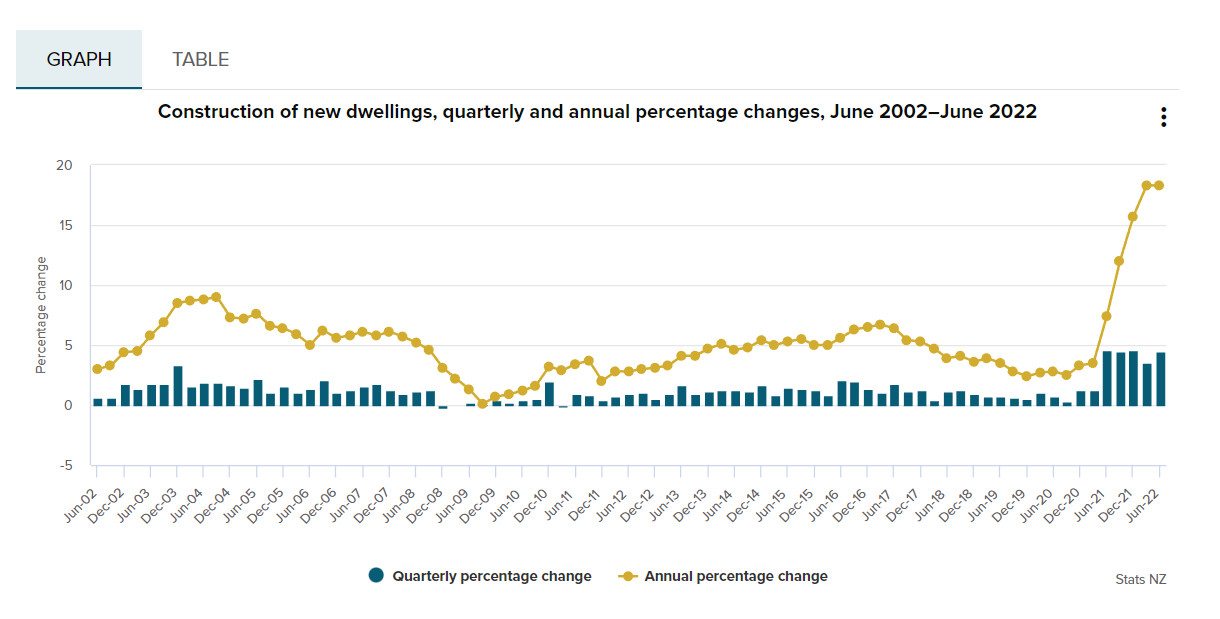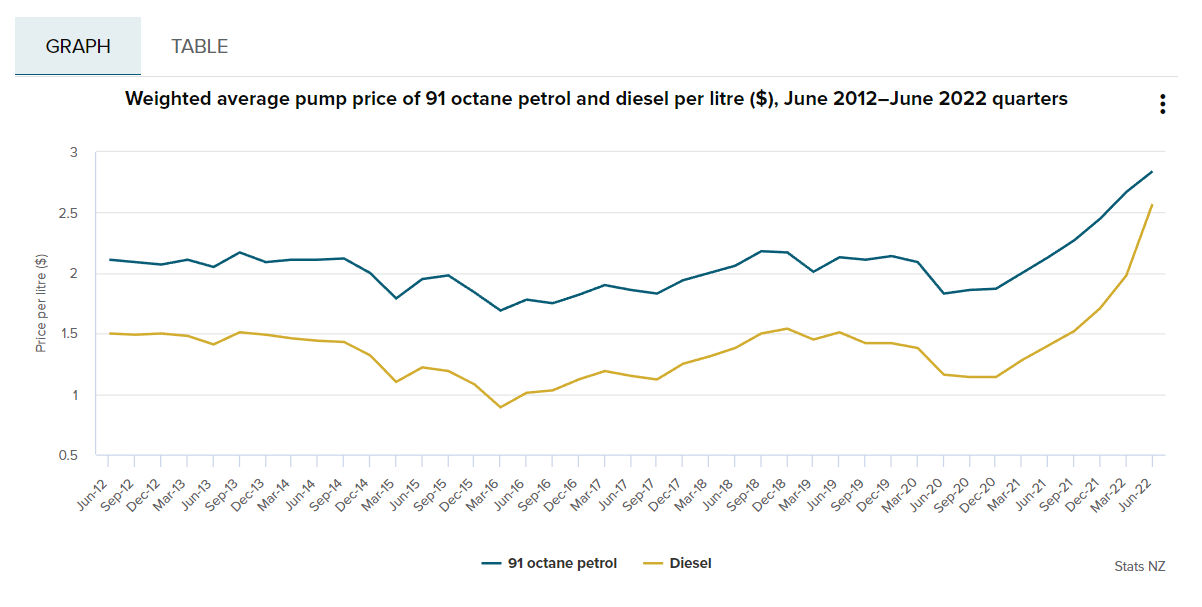The consumers price index increased 7.3 percent in the June 2022 quarter compared with the June 2021 quarter, Stats NZ said today.
The 7.3 percent increase follows an annual increase of 6.9 percent in the March 2022 quarter, the previous largest annual movement since a 7.6 percent increase in the June 1990 quarter that occurred shortly after the introduction of Reserve Bank of New Zealand Act 1989. The Act came into effect in February 1990 to target the high inflation from the previous decade and maintain stability in the general level of prices over the medium term.

The main driver for the 7.3 percent annual inflation to the June 2022 quarter was the housing and household utilities group, due to rising prices for construction and rentals for housing.
Prices for the construction of new dwellings increased 18 percent in the June 2022 quarter compared with the June 2021 quarter.
“Supply-chain issues, labour costs, and higher demand have continued to push up the cost of building a new house,” general manager Jason Attewell said.
“The 18 percent annual increase in the June quarter follows an 18 percent increase in March and a 16 percent increase in December 2021.”

Prices for building new houses in the CPI are obtained by surveying construction companies that build standard-plan houses. Sales of existing house prices are not included in the CPI as household-to-household transactions are out of scope. Land purchases are excluded as they are considered to be an investment and therefore out of scope.
Interest payments are also out of scope as this would produce a circular relationship between monetary policy and the CPI. Interest payments are included in the Household living-costs price indexes: June 2022 quarter, to be released on 26 July 2022.
Prices for rentals for housing increased 4.3 percent in the June 2022 quarter compared with the June 2021 quarter.
The next largest contributor to annual inflation was from the transport group, due to higher prices for petrol and diesel.
Petrol prices increased 32 percent in the year to the June 2022 quarter, the largest annual increase since the June 1985 quarter. Diesel prices increased 74 percent over the same period.
Quarterly inflation at 1.7 percent
The consumers price index rose 1.7 percent in the June 2022 quarter compared with the March 2022 quarter, mainly driven by the housing and household utilities group.
In the June 2022 quarter compared with the March 2022 quarter, construction prices rose 4.5 percent, while rentals for housing rose 1.2 percent.
Transport was also a main driver of the quarterly rise, driven by petrol and diesel.
“The average price of 1 litre of 91 octane petrol rose 6.3 percent to $2.84 in the June 2022 quarter, compared with $2.67 in the March 2022 quarter,” Mr Attewell said.
“The average price of 1 litre of diesel rose 30 percent to $2.57 this quarter, compared with $1.98 in the March quarter.”

The 25 cents per litre reduction in fuel excise duty, which came into effect in the March 2022 quarter, is not applied to diesel. Globally, demand for diesel is also exceeding supply, according to reports.
The rise in transport was partly offset by falling prices for road passenger transport, international airfares, rail passenger transport, second-hand cars, and other private transport services, which includes road user charges.
“Half-price bus and train fares came into effect from 1 April and prices for road user charges were reduced from 21 April. These price falls were reflected this quarter,” Mr Attewell said.
The Clean Car Programme had a small downward influence on prices for second-hand cars. Of the second-hand cars in our sample, more received rebates from programme than paid fees.
Tradable and non-tradable inflation record highs
The tradeable inflation rate, which measures goods and services that are influenced by foreign markets, was 8.7 percent in the year to the June 2022 quarter – the largest annual movement, either up or down, since the series began in June 2000.
Petrol; diesel; and milk, cheese, and eggs were the biggest contributors to the movement.
Domestic, or non-tradable inflation, was 6.3 percent in the year to the June 2022 quarter, the highest since the series began in June 2000.
Higher prices for construction, rentals for housing, and ready-to-eat food were partly offset by road passenger transport and rail passenger transport.
Non-tradable inflation measures goods and services that do not face foreign competition. It shows how domestic demand and supply conditions affect consumer prices.
Inflation rates around the world are currently higher than in recent years, with the OECD total at 9.6 percent for the year ended May 2022. Australia was at 5.1 percent to the year ended March 2022, The United Kingdom was at 9.1 percent to the year ended May 2022, and the United States was at 9.1 percent to the year ended June 2022.
Grand Robber swallowed the real savings of kiwis with quantative easing; Puppet Biden did the same thing first and the Globalists instructed all others in the West to do the same. If interest rate is kept below the rate of inflation, you cant expect any “transitory inflation”. It is gpoing to be persistent and billions of people will become poor. NWO agenda in action. We all have to leaern to be happy despite owning nothing.
Who gives a toss about inflation start screaming about the maiming and killing the vaxx is doing in this country.
The vax only harms the obedient,so i do give a toss about inflation
Printing of money will do this every time -they may as well photocopy it! Makes it worthless.
They firmly believe the best way to put out a fire is to smother it with petrol.
Pathetic National spokes person Nicola says “More immigration” for reducing the prices. Excessive import of low quality people has already crippled the infrastructure such as schools, hospitals and housing. Our per capita GDP is steadily falling. In real terms, we are getting poorer and poorer and highlt debted. Kiwis are living in streets and child povewrty is at the peak. What National party is suggesting as a solution atrociouswhich will benefit just a few. When supermarkets and other big box stores passed on the reduction in input costs to the consumer? Once the prices go up, they rarely come down. National should be ashamed to have Nicola as the deputy leader. She is just a show piece like Jacinda to fool kiwis.
The LAST thing we need is more immigration unless they are already skilled and qualified.
We have enough trouble looking after the people we already have.
Low IQ Nicola cant manage any ministry in a future government other than the NZ Ministry of Slums.